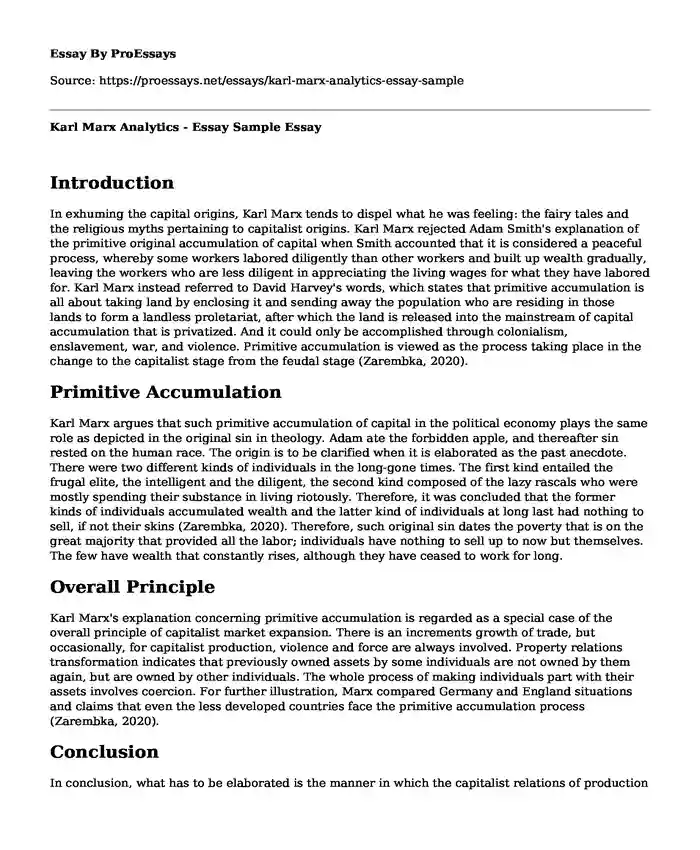Introduction
In exhuming the capital origins, Karl Marx tends to dispel what he was feeling: the fairy tales and the religious myths pertaining to capitalist origins. Karl Marx rejected Adam Smith's explanation of the primitive original accumulation of capital when Smith accounted that it is considered a peaceful process, whereby some workers labored diligently than other workers and built up wealth gradually, leaving the workers who are less diligent in appreciating the living wages for what they have labored for. Karl Marx instead referred to David Harvey's words, which states that primitive accumulation is all about taking land by enclosing it and sending away the population who are residing in those lands to form a landless proletariat, after which the land is released into the mainstream of capital accumulation that is privatized. And it could only be accomplished through colonialism, enslavement, war, and violence. Primitive accumulation is viewed as the process taking place in the change to the capitalist stage from the feudal stage (Zarembka, 2020).
Primitive Accumulation
Karl Marx argues that such primitive accumulation of capital in the political economy plays the same role as depicted in the original sin in theology. Adam ate the forbidden apple, and thereafter sin rested on the human race. The origin is to be clarified when it is elaborated as the past anecdote. There were two different kinds of individuals in the long-gone times. The first kind entailed the frugal elite, the intelligent and the diligent, the second kind composed of the lazy rascals who were mostly spending their substance in living riotously. Therefore, it was concluded that the former kinds of individuals accumulated wealth and the latter kind of individuals at long last had nothing to sell, if not their skins (Zarembka, 2020). Therefore, such original sin dates the poverty that is on the great majority that provided all the labor; individuals have nothing to sell up to now but themselves. The few have wealth that constantly rises, although they have ceased to work for long.
Overall Principle
Karl Marx's explanation concerning primitive accumulation is regarded as a special case of the overall principle of capitalist market expansion. There is an increments growth of trade, but occasionally, for capitalist production, violence and force are always involved. Property relations transformation indicates that previously owned assets by some individuals are not owned by them again, but are owned by other individuals. The whole process of making individuals part with their assets involves coercion. For further illustration, Marx compared Germany and England situations and claims that even the less developed countries face the primitive accumulation process (Zarembka, 2020).
Conclusion
In conclusion, what has to be elaborated is the manner in which the capitalist relations of production have been established historically. However, the way it comes about such production means getting traded in and privately owned and how the capitalist founds workers on the labor market willing and ready to work for them since they do not have any other livelihood.
Reference
Zarembka, P. (2020). Marxist Accumulation of Capital? In Key Elements of Social Theory Revolutionized by Marx (pp. 102-123). Brill.
Cite this page
Karl Marx Analytics - Essay Sample. (2024, Jan 01). Retrieved from https://proessays.net/essays/karl-marx-analytics-essay-sample
If you are the original author of this essay and no longer wish to have it published on the ProEssays website, please click below to request its removal:
- John Knox and His Impact on Scotland's History
- Government Strategies and Policies in Education Essay
- Book Analysis Essay on Narrative of the Life of Fredrick Douglas
- Student's Well Being Quantitative Study Paper Example
- Paper Example on Native American Cultural Heritage: Exploring Its History and Spirituality
- Paper Example on Strategic Plan Analysis: Gauging Goals & Objectives Achieved
- Essay Sample on Exploring Egypt's Ancient Art & Architecture: A Historical Journey







